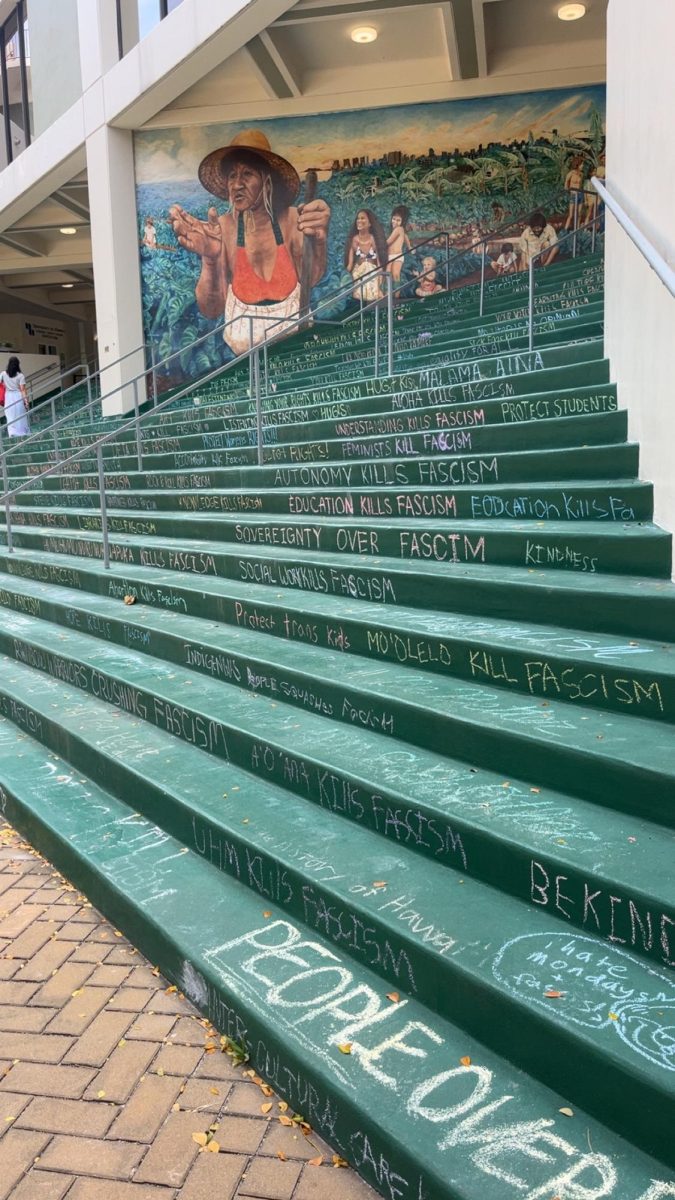
Laurel Galvin
Chalk on Campus Center Steps
Dozens of UH Mānoa students and employees gathered under rainy skies outside of Bachman Hall on April 17, huddling under tents as if to prove the strength of their solidarity.
Several student groups and national organizations worked together to educate about and protest the Trump administration’s efforts to reduce federal spending and dismantle the Department of Education. Since the federal funding freeze in early February, confusion and at times fear have plagued university students across the U.S.
The DOE is UH’s third-largest source of federal funding, according to President Wendy Hensel.
Programs terminated at UH represent approximately $30 million in federal funding, according to Hensel at the April 17 Board of Regents meeting.
This includes termination of equity related grants and research programs affecting over 40 employees. Research related to sustainability, renewable energy, and climate change has been affected.
International students are also affected as the Trump administration continues to revoke student visas. Out of 17,000 international students at UH, several have already had their visas revoked, according to UH President Wendy Hensel.
The protest included a panel, teach-ins, artistic workshops, and speeches and performances from various community members and UH students and staff. Topics included immigrant and LGBTQ+ rights, banned words, and dangers of “the erasure of history” that can come with dismantling institutions of higher education.
Hema Watson, a member of the organization committee of the Student Solidarity Network (SSN), helped to organize this event as part of a National Day of Action for Higher Education.
An unaffiliated student organization, SSN has been organizing students and staff at UH since January. The organization emerged as a response to the administration’s promises to cut federal funding.
“UH has one of the largest diverse populations of students anywhere,” Watson said. “And yet it’s super difficult for a lot of them to get up and get engaged … the atmosphere of the UH administration isn’t super helpful.”
Watson wasn’t the only UH community member who expressed disappointment in DEI language being removed from various UH-affiliated websites, following Trump’s executive order.
From Ph.D. philosophy candidate David Simone’s op-ed in Ka Leo, to UH geography and environment professor Marina Karides’ community voice column in Honolulu Civil Beat, UH community members have objected to the way UH administration has responded to executive orders regarding DEI.
The national organization Refuse Fascism attended the protest.
Fascism can be difficult to define, as it lacks a single defining philosophy, Simone said. Simone explained in a teach-in how Benito Mussolini, leader of the original fascist movement, never offered a clear definition for the term
“Even in the early 1900s, people started using [fascism] to mean any kind of authoritarianism,” says Simone. “In contemporary fascism studies, the definition that is most used is ‘palingenetic ultranationalism.’”
Combining “pal,” meaning “again,” and “genesis,” meaning “birth,” palingenetic ultranationalism refers to a nation as a living organism. Within this concept, the nation can be “born again,” purged from any “illness” which one plagued it.
Some political scholars say Trump has embodied this concept with remarks such as immigrants are “poisoning the lifeblood of our country.”
Simone explained how ultranationalism emphasizes the mythos of a country, “ignoring the bad parts of our history,” to emphasize the parts that seem good.
When asked how he would define fascism in a modern American context, Simone responded with “Make America Great Again.”
Online discussion over whether or not Trump can be labeled as a fascist has been ongoing—historians have even referred to it as the Fascism Debate. After years of hesitating to apply the term, historian Robert Paxton concluded after Jan. 6 that “the label seems not just acceptable but necessary.”
Whether labeled as “fascist” or “authoritarian,” the results of the administration’s actions are the same, Simone said.
“We’re living in a digital age,” Simone said. “[If] a lot of these website deletions and policy changes were happening 30 or 40 years ago, what would we be doing?” As Simone said in his op-ed, the result he came to was “burning.”
Regardless of censorship or acknowledgement, the persons whom DEI language refers to continue to exist at UH Mānoa and beyond. Ava Ladner, a lecturer at UH and a graduate of the American Studies program, spoke about the list of words flagged by the Trump administration.
In her speech, Ladner reflected on the word “transgender,” one of the flagged words. Ladner remarked that transgender individuals existed before the word, and will continue to exist whether the word is used or not.
Ladner was approached to speak at the event after her involvement in the April 1 chalking event at Campus Center, during which students used chalk to express themselves on the UH stairs.
“This is where history matters,” Ladner says.
“You need a popular front,” said Simone, echoing the idea that different groups of people need to work together toward a common goal. He reflected on the collaboration in the 1940s between former U.S. President Franklin D. Roosevelt, United Kingdom Prime Minister Winston Churchill, and Soviet leader Joseph Stalin to end World War II.
The sentiment of many voices together being impossible to ignore may have been proven true. UH President Wendy Hensel has signed a joint statement including over 170 other academic institutions to oppose the Trump administration’s education policies.